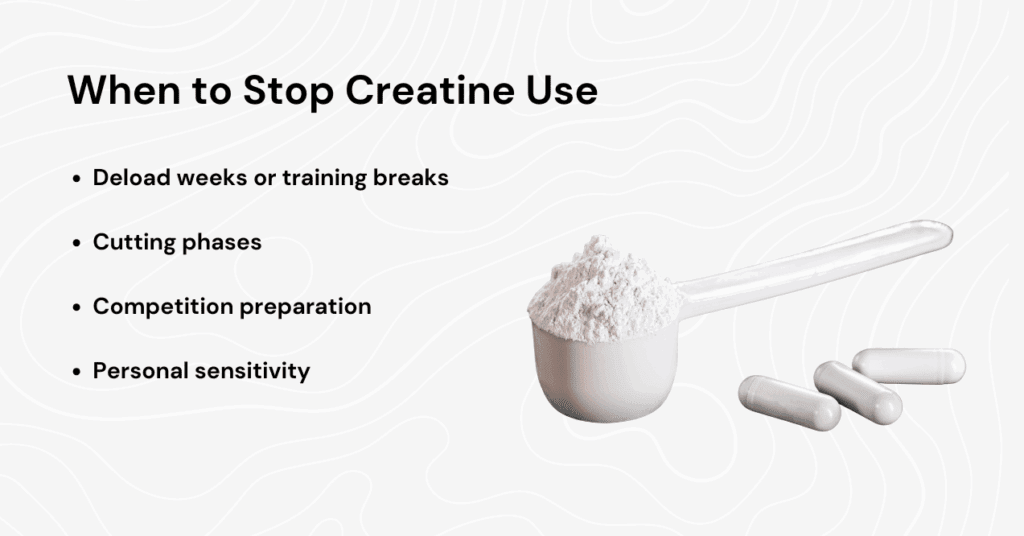What Happens if You Stop Taking Creatine?
Creatine stands as one of the most popular and extensively researched fitness supplements on the market today. This naturally occurring compound has earned its reputation by effectively supporting muscle growth, enhancing athletic performance, and promoting faster recovery between workouts. But what happens if you stop taking creatine?
The good news is that discontinuing creatine supplementation typically results in gradual, reversible changes rather than harmful effects. Your body will naturally return to its baseline creatine levels over time. Understanding these transitions can help you make informed decisions about your supplementation strategy and set realistic expectations for your fitness journey.
Whether you’re considering a break or simply curious about the process, this guide will walk you through everything you need to know.
What Does Creatine Do in Your Body?
Creatine functions as your muscles’ rapid energy reservoir, primarily supporting the production of adenosine triphosphate (ATP) – your body’s fundamental energy currency. During high-intensity activities like weightlifting or sprinting, your muscles rapidly deplete ATP stores. Supplemental creatine increases your phosphocreatine reserves, allowing for faster ATP regeneration and sustained power output during these demanding efforts.
Key benefits of creatine in your body include:
- Energy production – Replenishes ATP quickly during intense exercise, allowing you to maintain higher training intensity
- Muscle volumization – Draws water into muscle cells, creating a fuller appearance and optimal environment for growth
- Protein synthesis – Enhances the muscle-building process, supporting more efficient recovery and growth
- Strength development – Improves maximum power output during heavy lifting sessions
- Fatigue resistance – Delays the onset of muscle fatigue during repeated high-intensity efforts
For those seeking reliable creatine supplementation, Trumeta Creatine Trumeta Creatine delivers 5 grams of pure Creapure® creatine per serving to help build lean muscle, boost endurance, and support faster recovery. Designed for high-intensity workouts, it fuels cellular energy and even supports mental performance.
Its highly soluble, grit-free formula mixes easily – unlike lower-quality alternatives. Vegan, gluten-free, and clean, Trumeta Creatine fits seamlessly into any nutrition plan, helping you crush your fitness goals with confidence.
What Happens if You Stop Taking Creatine? Experts answer
When you discontinue creatine supplementation, your body undergoes several predictable changes as it returns to its natural baseline levels. These adjustments primarily affect performance and appearance rather than overall health.
Muscle Appearance and Performance
Upon stopping creatine, the most immediately noticeable change occurs in muscle appearance. Your muscles may look slightly smaller or “flatter” within 1-2 weeks – but this doesn’t represent actual muscle tissue loss. What you’re experiencing is the reduction of intramuscular water retention that creatine promotes.
Performance changes typically follow this visual shift:
- Power output during maximum efforts may decrease by 5-10%
- The ability to perform high-intensity repetitions often declines
- Recovery between intense sets may take longer
- Strength levels might drop slightly, particularly on compound movements
Weight Changes
Most individuals experience some weight loss after stopping creatine – typically between 2-5 pounds. This weight change represents:
- Water loss, not fat or muscle tissue reduction
- A natural physiological adjustment, not a negative outcome
- A more accurate reflection of your true body composition
Is It Safe to Stop Taking Creatine?
Stopping creatine supplementation is completely safe and poses no health risks whatsoever. Unlike certain substances that create dependency, creatine doesn’t cause withdrawal symptoms or adverse effects when discontinued.
Key safety factors when stopping creatine:
- No withdrawal symptoms occur, as creatine isn’t habit-forming
- Your body continues producing creatine naturally (1-2 grams daily)
- Natural production occurs primarily in your liver, kidneys, and pancreas
- Dietary creatine from foods like red meat and fish continues supporting your needs
- The transition happens gradually as muscle stores return to baseline
Many fitness enthusiasts cycle on and off creatine throughout the year with no negative consequences. This strategic approach can be beneficial:
- During different training phases or periodization cycles
- When pursuing specific body composition goals
- During maintenance periods versus muscle-building phases
- To assess your natural performance baseline occasionally
Can You Build Muscle Without Creatine?
Absolutely – you can build substantial muscle without using creatine supplementation. While creatine offers performance advantages, it’s not essential for muscle development. The fundamental drivers of muscle growth remain:
- Progressive overload through consistent resistance training
- Adequate protein intake (1.6-2.2g per kg of body weight daily)
- Sufficient caloric surplus for growth phases
- Quality sleep and stress management for optimal recovery
- Proper training volume and intensity
Countless individuals have achieved impressive physiques long before creatine became widely available. Your body naturally synthesizes creatine and obtains it through dietary sources like meat and fish, providing baseline levels that support normal muscle function.
Creatine supplements simply enhance these natural processes rather than create entirely new ones. Think of creatine as a performance optimizer that may accelerate progress by allowing more volume or intensity during workouts – not as a requirement for growth.
If you’ve stopped taking creatine or choose not to use it, focus on optimizing the fundamental growth factors above, and you’ll continue making steady progress toward your muscle-building goals.
When Should You Stop Taking Creatine?

While creatine is safe for continuous use, there are specific scenarios when to stop taking creatine based on your training goals and personal response. Consider pausing supplementation during:
- Deload weeks or training breaks – When deliberately reducing exercise intensity, creatine’s performance benefits may be less necessary
- Cutting phases – Some prefer to discontinue during fat loss periods to assess true weight and reduce water retention
- Competition preparation – Particularly for weight-class athletes who need precise weight management
- Personal sensitivity – If experiencing digestive discomfort or other mild side effects
Side effects like stomach discomfort often relate to timing and consumption methods. Many wonder about creatine on empty stomach effects – this can increase the likelihood of digestive issues for some individuals. Consider taking it with meals instead if you experience any discomfort.
Do you have to cycle creatine? Some athletes prefer cycling creatine (typically 8-12 weeks on, 4 weeks off), though research doesn’t indicate this is necessary for safety or effectiveness. Others use it year-round with excellent results. The decision comes down to your personal preference and how your body responds.
If you’re achieving desired results and experiencing no adverse effects, there’s no physiological reason to discontinue creatine supplementation – it remains one of the safest ergogenic aids available.
What to Do After Stopping Creatine
After discontinuing creatine, implementing strategic adjustments can help maintain performance and minimize any potential declines. Consider these practical approaches:
- Increase dietary creatine sources – Incorporate more red meat, fish, and poultry into your nutrition plan
- Optimize protein intake – Ensure you’re consuming sufficient protein (1.6-2.2g per kg of bodyweight daily)
- Maintain training intensity – Focus on progressive overload despite potential initial performance dips
- Consider alternative supplements – Beta-alanine, citrulline malate, or caffeine may provide different performance benefits
- Prioritize recovery – Enhanced sleep quality and stress management become even more crucial
If you stopped due to side effects like creatine headache – a relatively uncommon but reported symptom – consider these modifications before reintroducing:
- Increase water intake significantly when resuming (3-4 liters daily)
- Start with a lower dose (2-3g daily instead of 5g)
- Split dosing throughout the day rather than single servings
- Try different forms like micronized creatine or creatine HCL
- Always consume with meals to improve tolerance
For those wondering how long for creatine to leave system, research indicates your muscle creatine stores gradually deplete over approximately 4-6 weeks after discontinuation. This timeframe can vary based on several factors including your initial saturation levels, metabolic rate, and activity levels. Your body continues producing creatine naturally (about 1-2 grams daily), so levels never drop to zero – they simply return to your pre-supplementation baseline.
The transition occurs gradually rather than abruptly, allowing your body time to adjust to these physiological changes.
Conclusion
Understanding what happens if you stop taking creatine empowers you to make informed decisions about your supplementation strategy. The effects – including slight decreases in muscle fullness, potential performance dips, and minor weight loss from water reduction – are all temporary and represent natural physiological adjustments rather than concerning side effects.
Stopping creatine is completely safe with no withdrawal symptoms, as your body continues its natural creatine production. Whether you choose to cycle off periodically or maintain continuous use depends entirely on your individual goals and preferences.
No, you won’t lose actual muscle tissue when stopping creatine. Any visual change is primarily due to reduced water retention within muscle cells rather than loss of contractile proteins or muscle mass.
Strength and muscle gains achieved during creatine supplementation aren’t immediately lost upon discontinuation. The actual muscle tissue built remains, though some performance benefits and water-related volume may temporarily decrease.
Yes, many people appear slightly leaner after stopping creatine due to reduced water retention in muscles. This effect can enhance muscle definition and vascularity, particularly noticeable within 1-2 weeks after discontinuation.
Yes, you can take creatine without exercising, but you’ll miss most benefits. Creatine primarily enhances high-intensity performance and recovery, which requires physical activity to trigger. Non-exercisers may only experience minimal cognitive benefits.
Advertisement. This site offers health, wellness, fitness and nutritional information and is designed for educational purposes only. You should not rely on this information as a substitute for, nor does it replace, professional medical advice, diagnosis, or treatment. If you have any concerns or questions about your health, you should always consult with a physician or other health-care professional. Do not disregard, avoid or delay obtaining medical or health related advice from your health-care professional because of something you may have read on this site. The use of any information provided on this site is solely at your own risk.







